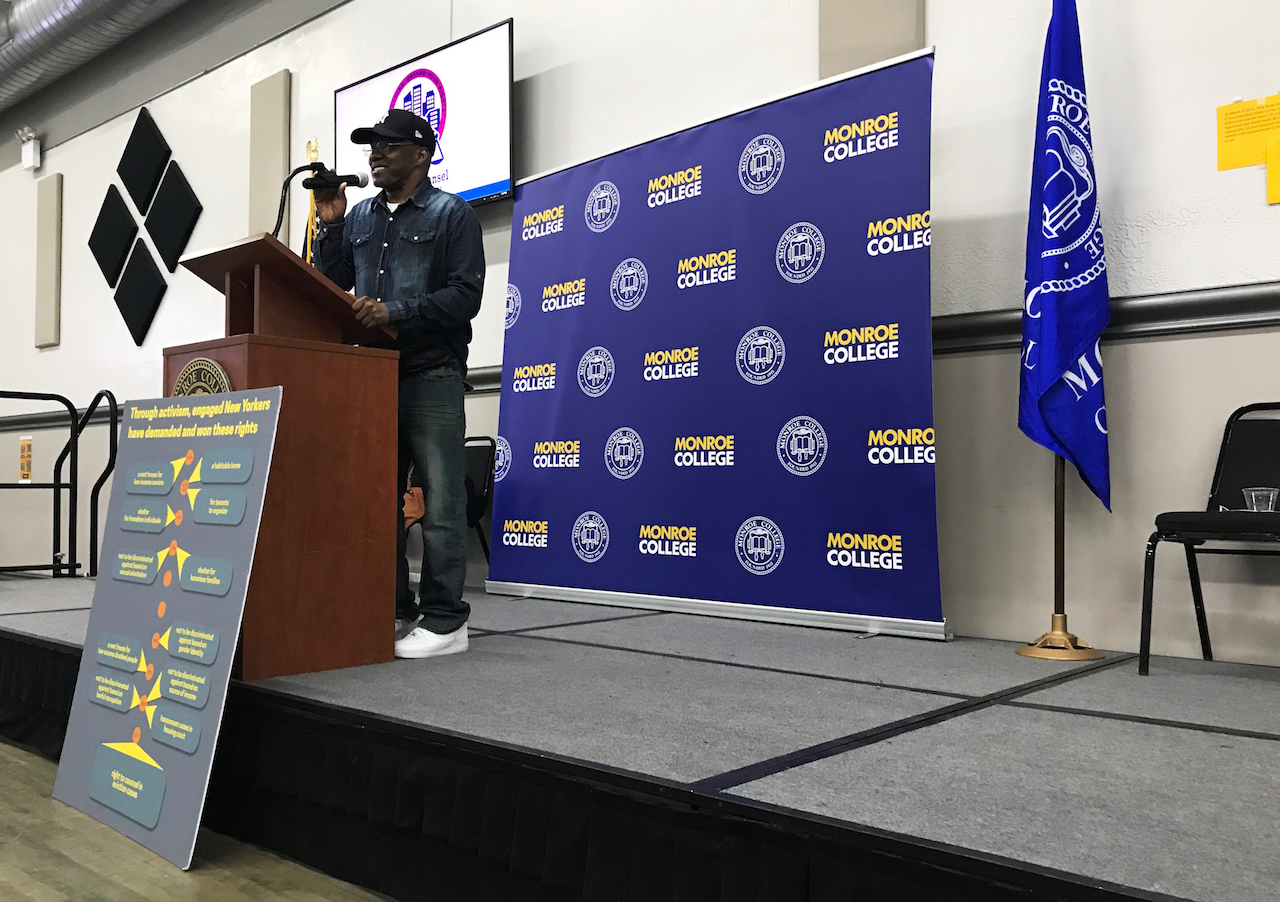
After lying in a hospital for two months battling emphysema, Randy Dillard was ready to go home. The doctor put him on bed rest, and Dillard returned to his small house and five children in Bedford Park.
A few days later, Dillard’s landlord served him an eviction notice.
It was a similar story for Carmen Vega-Rivera, who has spent more than seven years in housing court fighting to stay in her Concourse Village home after her landlords repeatedly tried to evict her.
According to Vega-Rivera, it’s not a matter of tenants neglecting to pay rent or inciting behavior that would warrant eviction. Landlords want low-income residents out so that tenants with disposable income will move in, she said, particularly as the city prepares to rezone 92 blocks on Jerome Avenue.
“Rezoning and gentrification are one and the same, and they cause displacement,” said Vega-Rivera, who is now a tenant leader at CASA: Community Action for Safe Apartments. “It hurts my heart to see my community members when they’re crying and have nowhere to go.”
But advocates say that tenants now have an opportunity to fight back against displacement, with the help of a new law called Right to Counsel (RTC), which passed the City Council last year. It requires the city to fund counsel for low-income tenants facing eviction, and comes at a tense time for many South Bronx residents who find themselves the targets of predatory landlords in changing neighborhoods.
Housing advocates and tenants gathered for a town hall meeting at Monroe College on April 12 to discuss the new law’s possible benefits for residents. In March, the City Council approved the Jerome Avenue rezoning plan, as part of Mayor Bill de Blasio’s push to create 300,000 units of affordable housing by 2026.
One provision of the rezoning plan, Mandatory Inclusionary Housing (MIH), calls for 10 percent of units built to be made affordable for households earning $31,080 annually. The median income for Bronx residents is around $35,000 per year, but more than 10 percent of the population makes less than $20,000, according to City-Data.com. Seniors and single mothers are the most vulnerable demographics, with almost a quarter of single women with children in the Bronx earning less than $10,000 per year.
A report released last year by the Real Affordability for All coalition revealed that of all the proposed affordable housing in the entire city, only 11,000 units are designed for households earning $25,000 and below (for a family of three) per year.
This means, Vega-Rivera said, that the population needing affordable housing the most wouldn’t be receiving it.
“You have to understand, where we live in this area there are colleges, high schools, transportation…it’s prime territory,” said Sergio Cuevas, housing committee member of the Northwest Bronx Community and Clergy Coalition. “It’s common for landlords to try and dispossess tenants. It’s very disheartening when people have to move every few years, it destabilizes the community.”
Fear of displacement is also rippling through communities like Longwood, Hunts Point and Mott Haven, where the city’s Southern Boulevard Neighborhood Study is currently taking place. Wanda Salaman, executive director of nonprofit housing advocacy group Mothers on the Move, said that it’s inevitable that projects that start with a study will end with rezoning. But, she added, the new bill is a huge win for low-income residents and immigrants in the community, most of whom wouldn’t stand a chance in housing court without a lawyer. And it’s not just the tenants Salaman fears for — Right to Counsel could be critical for small businesses pressured to evacuate as new developments move in.
“Bodegas and storefront owners also get harassed, and if they don’t have a good lawyer they face displacement,” she said. “All these people matter to the history of these communities. They survived and kept the community going during times when no one wanted to be here at all.”
Before the bill passed, Dillard was one of a lucky few to have an attorney during his two and half years fighting in housing court. Without one, he suspects he would have ended up in a shelter with his five children, one of whom is autistic, another with asthma.
“I kept telling my kids everything was going to be alright, but I didn’t know if everything was going to be alright,” he said. “I was still scared, even though I had a lawyer. There’s no way I would have lasted this long in housing court without an attorney. It’s a living nightmare.”
Dillard’s case was nerve-wracking for Michael Leonard, a staff attorney at the Urban Justice Center in the Bronx, who represented him.
“There were a lot of things we did on the court end that would have been really hard to do without a lawyer,” he said. “We walked down that people together, years in housing court struggling. And the struggle is just warming up. The RTC is a massive win, but it’s just the beginning of how we’re going to implement a system of justice.”
Led by Bronx tenants and community members, passing the RTC bill makes New York the first city in the country to fund low-income tenants’ right to an attorney to protect their homes. It is being phased in by zip codes; right now, tenants 10457 and 10467 in the Bronx have a right to an attorney, with zip code 10468 to follow. The city anticipates the law to be fully phased in by the summer of 2022.

